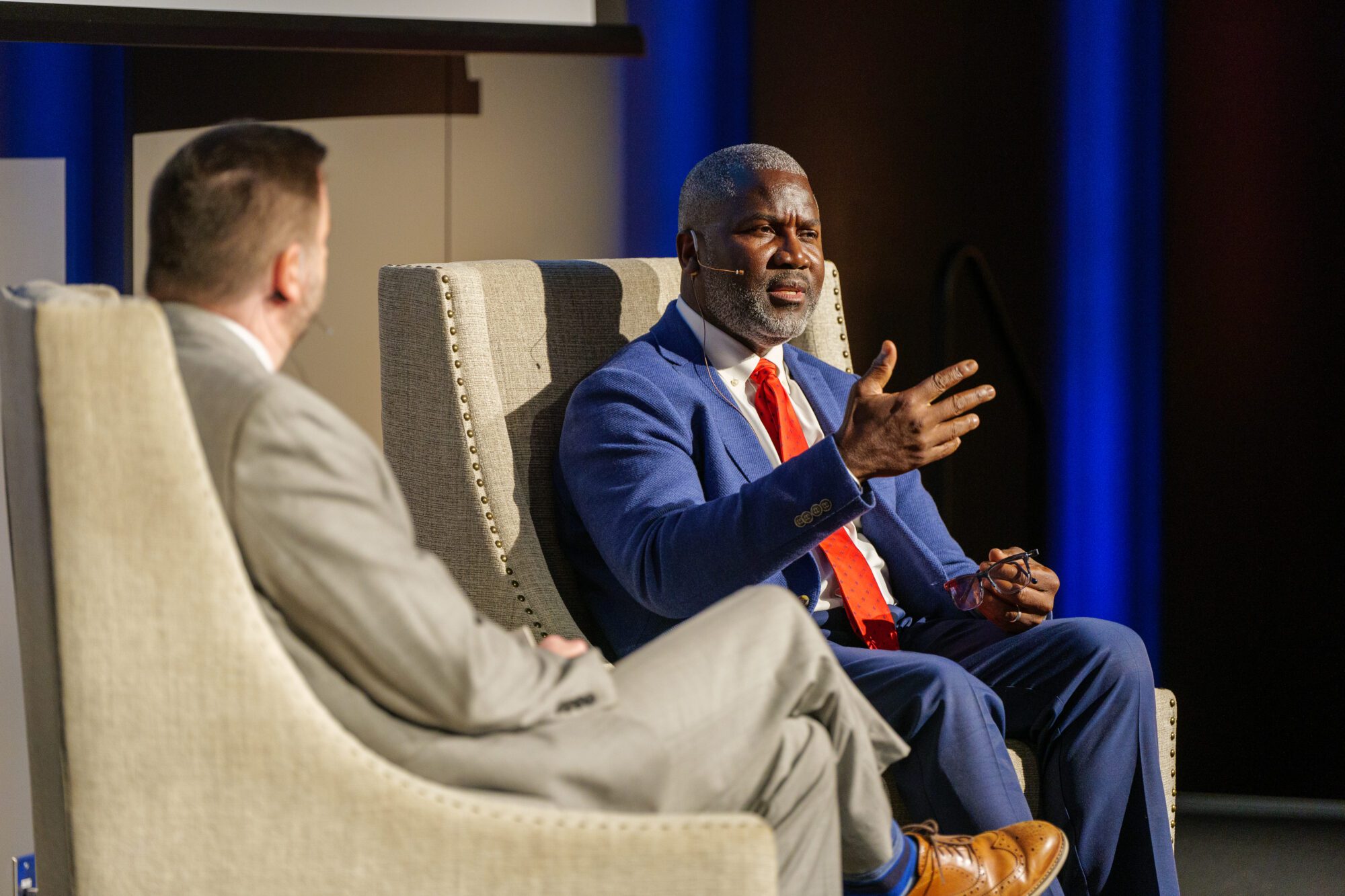
After over 20 years of consistent economic growth, Mississippi is bouncing back following the pandemic better than some economists expected.
Mississippians have witnessed the state’s economy grow over the last 20 years. The growth comes despite a recession in 2009 and a global scale pandemic in 2020.
In that time, the state’s gross domestic product (“GDP”) has risen, unemployment is down and the median income has also gone up for the average worker. The state has also gone from operating at a deficit to operating with large surpluses in recent years.
Despite growth, challenges remain. Not all industries are experiencing improvements, population is stagnant, and workforce issues continue to plague the state.
Steady Increase of GDP
A state’s GDP is a measure of the size of its economy. It is calculated by the total of monetary or market value finished goods and services that are produced there within a certain time frame. This number is usually compiled on an annual or quarterly basis. Real GDP takes into consideration the impact of inflation while Nominal GDP does not.
It provides a “snapshot” of a state or country’s economic state and growth rate.
According to the U.S. Bureau of Economic Analysis, Mississippi’s GDP has grown since 2000. At that time, it was calculated at $66 billion and has grown to just under $139 billion through 2022. This number was unadjusted for inflation.
When adjusted for inflation, or looking at Real GDP, the federal government data reported in 2000 the Mississippi GDP was at $88 billion and in 2022 $104.5 billion. According to State Economist Corey Miller, this is a growth of 18.7% over that roughly 22-year time period.
“In comparison, real GDP for the U.S. grew 52.3% over the same time period, or about 2.4% per year,” said Miller.
There was a slight dip between 2008 and 2009 when the country experienced what is known as the Great Recession, a period considered by many to be the worst economic downturn since the Great Depression.
Associate Professor and Chair of the Department of Economics of the University of Mississippi. Joshua Hendrickson says the state’s economic growth has risen roughly 1% on average over the last 25 years. While this number looks low, he said it is mostly due to the hard hit the state took in 2009.
“Economic growth from 2009 until 2014 averaged -0.2% per year. Per capita personal income in Mississippi has grown about 140% over the last 25 years, an average rate of 3.6% a year,” said Hendrickson.
According to Miller the state came through the 2020 recession much better than it did the Great Recession.
“The state took a large hit in the Great Recession in 2009 that took years to recover from, both in terms of real GDP and employment,” said Miller.
Since 2019 Mississippi’s real GDP has grown 3.5%, which ranks 32nd among the states. Nearly half of that growth has been attributed to the manufacturing sector. This sector typically ranks first or second among industries in the state.
About 35% of that real GDP growth has come from the Professional and Business sector, as the next largest, and service sectors have become a much larger portion over the years.
However, mining and oil as well as gas extraction have dragged the GDP growth reducing it by almost 17%. The second largest drag has been the government sector, including federal, state and local, by a reduction of roughly 15%. According to Miller the government is usually one of the top two sectors in size in terms of the state’s real GDP.
“The real GDP of most sectors in the state has surpassed its 2019 level, but some of the sectors that have not include Mining, Government, Health Care, and Transportation and Warehousing,” said Miller.
Leadership During Growth
For the last 20 years, Mississippi has been primarily under Republican leadership. The first Republican Governor elected since Reconstruction, Kirk Fordice, took office in 1992. He was followed by Ronnie Musgrove (D) who served one term. Haley Barbour (R) followed Musgrove for two terms with fellow Republicans Phil Bryant and Tate Reeves following.
“The success that we’ve seen over the past 20 years begins with the hard-working people of Mississippi. They have risen to every occasion. Teachers and students have excelled under new policies that were designed for their success. Companies have invested, and our workforce has answered the call. The last 20 years have been marked by unprecedented progress that began under the leadership of Haley Barbour and continues now under Tate Reeves,” said former Governor Phil Bryant.
This year, leadership boasted of a revenue surplus of $700 million over estimates. At the time, Governor Tate Reeves posted that the state’s economic strength and effectiveness was due to conservative budgeting practices.
“This money is burning a hole in Democrats’ pockets. They want to blow through this money by expanding welfare and spending it on pet projects. I want to return it to Mississippians,” said Reeves.
Some have questioned how the state’s revenue continues to grow despite global economic hardships due to inflation and rising interest rates. State Economist Corey Miller said that inflation trends tend to have a positive impact on state revenue as long as people continue to have purchasing power.
Local Impact
Robert Whitley, with Whitley’s Florist and Flower Delivery in Jackson, has run a family operated business since 1947. Whitley said, despite COVID, their business has been consistently good for the last 20 years.
“Excluding COVID, the business climate in Mississippi has been good. But now, supplies have gone up in price,” said Whitley. He said since the pandemic it’s been like they’re still experiencing it all the time.
Prices for most supplies necessary to run his business have gone up 80 percent, some have doubled.
“Staple items like carnations cost double now than what they did in 2019,” said Whitley. “Wholesalers don’t expect prices to go down. They say the growers are milking this as long as they can.”
However, despite the higher prices, Whitley said his customer base has returned. He said they rarely lost any business at all and things have somewhat gone back to normal.
“We’ve had to increase prices, but customers are still coming in and buying things,” said Whitley.
Mississippi still ranks at 30th in State Business Tax Climate according to the Tax Foundation. Hendrickson said the inability to rival states like Texas and Tennessee largely rests in Mississippi’s high sales tax. He said a way to improve that ranking would be a comprehensive tax reform.
“State governments often make the mistake of trying to manage growth from the top-down, carving out special subsidies or privileges for specific companies or industries. This might yield short-term economic success, but is not a good long-term strategy,” said Hendrickson.
In 2022, the Legislature passed the largest tax cut in Mississippi history, the provisions of which began phasing in this year with the elimination of the lowest tax bracket and the creation of a flat tax on income. The tax rate will fall to 4 percent from 5 percent by 2026.
The House of Representatives, under outgoing Speaker Philip Gunn, originally proposed the complete elimination of the income tax. The proposal was met with resistance in the Mississippi Senate and a compromise was reached that fell short of the House’s proposal.
“Politically, tax reform has proven difficult. Eliminating or reducing taxes is quite popular, but finding other sources of revenue is unpopular,” said Hendrickson.
Individual Income on the Rise
Along with the state making more money, residents of Mississippi have also increased their per capita income.
In 2000 the per capita income for the average Mississippian was somewhere around $21,500 annually. In 2022 that number has more than doubled to $46,200.
While this number shows extreme growth for the state specifically it continually registers low on a national scale. According to the United States Comparative Trends Analysis, current per capita income (PCI) averages at $65,423. This is nearly $20,000 higher than Mississippi’s average. In 2000, that number was closer to $31,000.
Income in the state continues to rise, it is at a lower level than others, but Mississippi maintains the cheapest cost of living. Forbes reported that Mississippi’s cost of living index score is 83.3. It also has the lowest average housing costs in the nation at 33.7% below national averages.
“We’re witnessing record economic success because we put the work in over the years to implement a fiscally conservative, pro-growth agenda that has benefited Mississippians across the state,” said Governor Tate Reeves on the economic success. “We’ve cut taxes, raised academic achievement to record highs, made historic investment into workforce development programs, and went to work when other states shutdown due to COVID. Our state has a lot to be proud of, and it’s because of the people who live and work here.”
Unemployment Rates Continue to Come Down
With incomes on the rise and revenue staying up, Mississippi’s unemployment rate also continues to decrease. The state’s unemployment rate had dropped for the fifth consecutive month, landing at 3.0% in July.
This is half a point lower than the current national average of 3.5% and on par with surrounding Southern states.
Unemployment claims continue to be lower than they were pre-COVID. However, gaps in a skilled labor market are now the focus of many small businesses. Employers across the state continue to report difficulty filling open positions or finding qualified applicants for those jobs.
Roughly 61% of businesses reported hiring or trying to hire someone qualified in July. 92% said there were very few or no qualified applicants.











